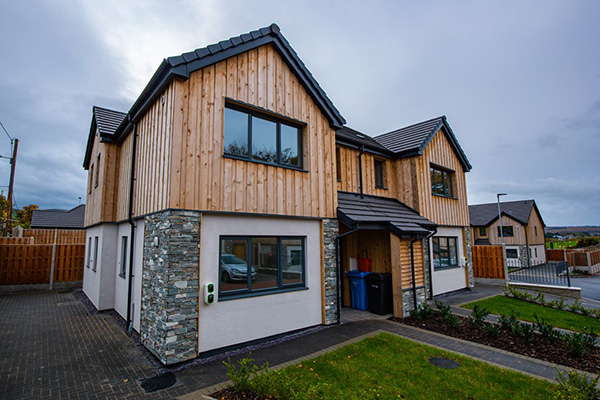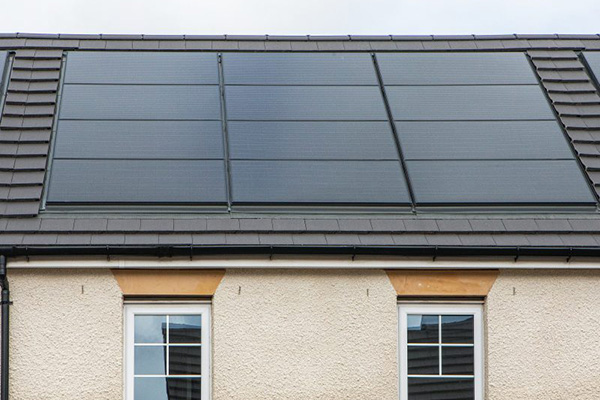
In Wales Climate Week: how the sector could decarbonise
The housing sector is keen to retrofit its stock, but it needs help from the Welsh government to make that happen, argues Bethan Proctor
This week is Wales Climate Week and it is a reminder, particularly as we transition into the colder winter months, that it is often the poorest in society who contribute the least to carbon emissions. While many of us may be conscious that working from home will increase our energy bills, for those living in fuel poverty, there are long, dark months ahead of going to bed early to keep warm and only eating cold meals.
“Although every housing association is ambitious to meet these targets and become a low carbon sector, they will not be able to do so without adequate support and investment”
In Wales, 12% of the population is blighted by fuel poverty. That’s 155,000 households that will struggle to pay their bills, will be unable to top up their meters, and will suffer in cold, damp housing this winter.
Housing associations work hard to support their tenants by developing good quality, affordable homes and providing debt and energy advice to those who need it. However, energy prices continue to rise, incomes continue to stagnate, and jobs continue to disappear, plunging many more into fuel poverty.
Wales Climate Week is also a reminder that housing is responsible for 13% of the UK’s greenhouse gas emissions and nearly 8% of Welsh emissions. We have international, European and Welsh obligations to mitigate climate change, with the Paris Accord, the EU Energy Performance of Buildings Directive 2010, the Well-being of Future Generations (Wales) Act 2015 and the Environment (Wales) Act 2016.
The Better Homes, Better Wales, Better World report has recommended that the social housing sector in Wales decarbonises its stock by 2030. All housing associations are ambitious to meet these targets and for the sector to become low carbon, but this will not happen without adequate support and investment.
Our research into financing decarbonisation shows that the cost of decarbonising all 230,000 units in the Welsh housing sector will be more than £4.2bn. This represents a 150% increase in major repairs spend for 10 years – a huge investment requirement at a time when we were also committed to continuing to tackle the housing crisis by building new homes. Tackling the major societal challenges of climate change and a housing crisis will bring significant financial challenges.
“Housing associations can be the responsible developers, rooted in communities for the long term, who deliver high-quality, energy-efficient and affordable homes across all tenures”
Finally, Wales Climate Week is a reminder that a green recovery is possible. We’ve seen the devastating impact that COVID-19 has had on jobs, health and livelihoods. Investing in a green future could create employment opportunities, develop energy-efficient homes that benefit people’s health and tackle fuel poverty.
Our report on the socio-economic impact of affordable homes demonstrates that building 75,000 new, affordable, energy-efficient homes and retrofitting our existing stock to decarbonisation standards can support £23.2bn of economic activity across Wales. It can create 50,000 jobs in the wider economy, provide 19,500 training and apprenticeship opportunities, and grow to employ 16,000 employees. Furthermore, a well-being impact of more than £190m can be generated, and fuel bill savings of more than £1.8bn and £0.5bn worth of carbon savings can be made.
However, Wales Climate Week needs to be more than just a series of reminders. We need to see action and investment on climate change prioritised urgently.
Our manifesto, Home, which is being launched next week, sets out our ideas for change ahead of the Senedd (Welsh Parliament) 2021 elections. We know that the next government of Wales will have difficult trade-offs to make. It will still have a pandemic looming over all its decisions, and a balanced investment programme is needed to boost the economy and improve the health and well-being of the whole nation and future generations.
Capital investment also needs to be prioritised and measured according to the impact it can have on future generations. This should include a five-year, £1.5bn investment programme of at least 20,000 new energy-efficient social homes, and a 10-year £4bn stimulus package backed by a mix of public and private funding to retrofit social homes by 2030.
“It is vital that the government itself listens and understands the importance of its own role in tackling climate change”
In return, housing associations can be the responsible developers, rooted in communities for the long term, delivering high-quality, energy-efficient and affordable homes across all tenures. We can build strong local supply chains to make existing homes more environmentally friendly by working with training providers and local businesses.
We will make public money go further by matching every £1 invested in building new social housing and will use our procurement processes to support local businesses. We will become a low carbon sector by taking action across all of our activity to reduce our carbon footprint and actively seeking opportunities to positively tackle the climate emergency.
And we will explore renewable energy solutions that create jobs, reduce energy bills and tackle fuel poverty, investing time and resources in building community trust and engagement.
The Welsh government wants Wales Climate Week to provide practical examples of what individuals and organisations can do to help fight against Wales’ climate emergency. But it is vital that the government listens and understands the importance of its own role in tackling climate change, by prioritising investment in a low carbon future delivered by housing associations.
Bethan Proctor, policy and external affairs manager, Community Housing Cymru












